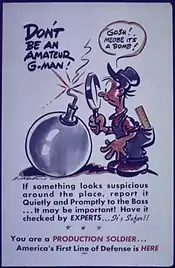G-man
G-man (short for "government man", plural G-men) is an American slang term for agents of the United States Government. It is especially used as a term for an agent of the Federal Bureau of Investigation (FBI).

American World War II home front poster "Don't be an Amateur G-man!"
G-man is also a term used for members of G Division, essentially a British anti-rebel police unit operating out of Dublin Castle prior to Irish Independence in 1922. Colonel Ned Broy uses the term in his official testimony for the Irish Army's Bureau of Military History in their archive of the Easter Rising (1916) & the Irish War of Independence (1919–1921).
Origins and use in media
- According to the Merriam-Webster Dictionary, the term "G-man" was first used in the year 1928.
- The earliest citation in the Oxford English Dictionary for the American usage of the term "G-man" was in 1930, from a biography of Al Capone by F. D. Pasley.
- The nickname may have originated during the September 1933 arrest of the gangster George "Machine Gun" Kelly by agents of the Bureau of Investigation (BOI), a forerunner of the FBI. Finding himself unarmed, Kelly supposedly shouted, "Don't shoot, G-men! Don't shoot!"[1]
- The term was the basis of the title for the 1935 film G Men, starring James Cagney, which was one of the top-grossing films of that year.
- The promotional artwork for the 1935 film Confidential used the tagline "COMEDY-MELODRAMA-SUSPENSE IN A UNIQUE 'G-MAN' STORY".[2]
- Curly Howard is referred to as a "G-man" in the 1936 Three Stooges short film A Pain in the Pullman.
- Kelly's surrender is dramatized in the 1959 film The FBI Story. The encounter with Kelly is similarly dramatized in the 1973 film Dillinger. The film was followed by a 1974 television film titled Melvin Purvis: G-Man.
- The Spanish Rock band Hombres G got its name in 1983 from the Spanish translation of "G-man" and after the James Cagney film G Men.[3]
- In the video game franchise Half-Life, introduced in 1998, one of the main characters is a "sinister interdimensional bureaucrat" called G-Man, who speaks in a cryptic manner and places the main character Gordon Freeman into stasis at the end of the first game.
- The 2011 film J. Edgar includes a reference to the surrender scene in the 1959 film The FBI Story.
- In the 2011 film X-Men: First Class, Charles Xavier refers to his team as the "G-Men", but Moira MacTaggart states that they are something different, and decides to name the team "X-Men". Charles finds the name amusing and keeps it.
- In the 2013 video game Grand Theft Auto V, government agents encountered throughout the game are occasionally referred to as G-men.
- In episode 4 of the television series WandaVision, titled "We Interrupt This Program", one of the police officers that Monica Rambeau and Jimmy Woo encounter while investigating the town of Westview calls Jimmy a G-Man
See also
References
- "Timeline of FBI History". Federal Bureau of Investigation. Archived from the original on 2006-11-21. Retrieved 2006-11-23.
- https://upload.wikimedia.org/wikipedia/en/1/1a/Confidential_%28film%29.jpg
- "Hombres G". HombresG.Net. Retrieved 2018-07-08.
This article is issued from Wikipedia. The text is licensed under Creative Commons - Attribution - Sharealike. Additional terms may apply for the media files.